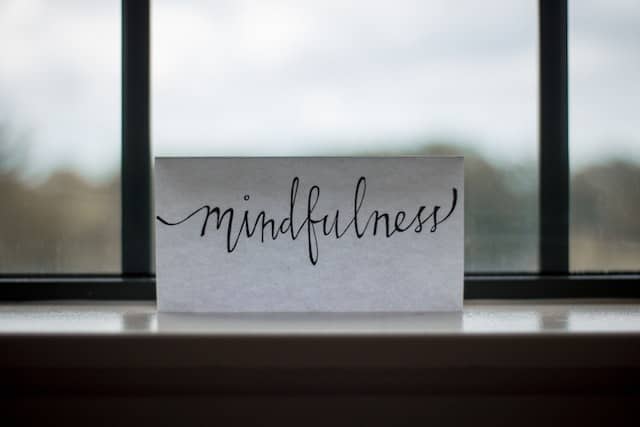We all want to be happier, more productive, and more in control of our lives. But sometimes it’s hard to know where to start. That’s why I like mindfulness—it’s a simple skill you can use every day that will help you do just that! Mindfulness is simply the act of being fully present in the moment, without focusing on what happened in the past or worrying about what might happen tomorrow. It doesn’t have to take up much time and it won’t cost anything either: all you need is a little space, some quiet time, and maybe some incense if that helps you relax (not required).
With that said, here are six easy ways to incorporate mindfulness into your daily life so you can get started on making those changes today!
Declutter your space
Decluttering your space is a great way to declutter your mind. When everything is organized and put away, it makes it easier for you to focus on what matters most in life. Start by going through all of the drawers in your kitchen and removing old utensils, food containers, etc., that are no longer needed. If a drawer isn’t being used often enough to warrant its own use, try combining similar items into one drawer so that each drawer has fewer items in it. You can also organize the cabinets above your countertops by stacking plates or bowls vertically rather than horizontally so there’s more room for other things like cups or mugs!
Start your day one step at a time
Start your day one step at a time. It’s easy to get caught up in the hustle and bustle of life, but if you make mindfulness a habit, it can change your life. When you begin each day by focusing on positive thoughts, paying attention to how you feel physically and mentally, and taking some time for yourself before tackling the rest of your morning tasks—you’ll be better equipped to handle whatever comes your way.
If this is something that’s new for you or if it feels intimidating because there are so many things on your agenda (and not enough hours in the day), start by setting an alarm for 5 minutes earlier than when you normally wake up. This gives you enough time to stretch and breathe deeply before getting into bed for another half hour or so. Then do some yoga poses: Sun Salutations are great because they’re both energizing and calming!
Next, take some time for light exercise like walking around the block or doing squats (this will help keep blood flowing throughout all parts of the body). Break out those healthy fats by eating breakfast! Finally, focus on one thing at a time during this early morning routine; don’t worry about everything else that may or may not happen later on today.
Remember the power of deep breathing
Breathing exercises are a great way to calm down. They can help you relax and get more oxygen into your body. This can be especially useful if you’re feeling stressed or anxious, as it reduces the amount of stress hormones released into the bloodstream, making it easier for your body to relax. Breathing exercises also help with getting more oxygen into the brain, which is important because our brains need oxygen more than any other part of our bodies!
So how do breathing exercises help? The most basic thing you need to know is that when we breathe in air through our nose, we take in both oxygen (O2) and carbon dioxide (CO2), which travels from our lungs through arteries and veins before being exhaled from our mouth as we breathe out again. This process then repeats itself over again. Now here comes the fun bit: when we consciously control how long each breath lasts before taking another one next time around; this controlled breathing helps reduce stress levels since there’s less fluctuation between intake ratios than normal respiration would otherwise produce by default.
Be an observer of your own thoughts
In mindfulness, you are simply an observer of your own thoughts. You don’t have to change them or judge them in any way. You simply observe them as they come and go.
If you find yourself caught up in a thought pattern that’s distressing or unhelpful, it can help to take a step back and ask yourself: “What is this feeling?” Often times we get so wrapped up in our thoughts that we forget to even identify what they are—we just assume that they’re true or real without questioning their validity. By taking the time to really examine each thought as it happens and asking questions about why it’s coming up for you (e.g., “Why do I feel like my boss doesn’t trust me?”), you can begin to peel away the layers of self-judgment and fear associated with those specific thought patterns until all that remains are simple observations about your moment-to-moment experience (e.g., “I’m having trouble concentrating.”).
Practice for short periods, and build up over time
It’s important to start small, and build up your practice over time. You don’t have to aim for 15 minutes right away—if you can only do five minutes, that’s fine! The key is just to do it regularly.
You might be wondering how much time you should spend on mindfulness meditation each day or week. The truth is that it doesn’t matter as long as you are consistent with your practice. You could meditate for 10 minutes once a week and still get many benefits from the activity; however, spending just 5 minutes every morning could make a huge difference at the beginning of your day.
Find a mindfulness routine that works for you
A mindfulness routine, simply put, is a set of activities you do on a regular basis to help you become more mindful. The most effective routines are tailored to your needs and preferences—otherwise, they won’t stick and become part of your daily life.
For example, if you’re not much of a runner but love yoga, then taking up morning yoga classes would be a great way for you to integrate some mindfulness into your day-to-day activities. On the other hand, if running is something that comes naturally to you or provides some stress relief from work, then hitting the streets at least once per week might be just what’s needed for maintaining good mental health and well-being over time.
You can practice mindfulness every day.
You can practice mindfulness every day, even if it’s just for a few minutes. It might be difficult to find time to do it, but it’s worth the effort.
The truth is that we don’t need to wait until we have an hour-long chunk of time in which we can devote ourselves wholeheartedly to mindfulness—we can practice in small ways at any time. In fact, there are plenty of apps and websites available that allow you to take advantage of short breaks throughout your day so you can incorporate more mindfulness into your life. These tools include:
Start small by implementing one of these habits into your routine. You can begin by decluttering your space or taking a few deep breaths. With practice and patience, you will eventually be able to incorporate all six practices into your daily life. Remember that mindfulness is a journey, not a destination; there’s no need to be perfect at it—just keep practicing!








